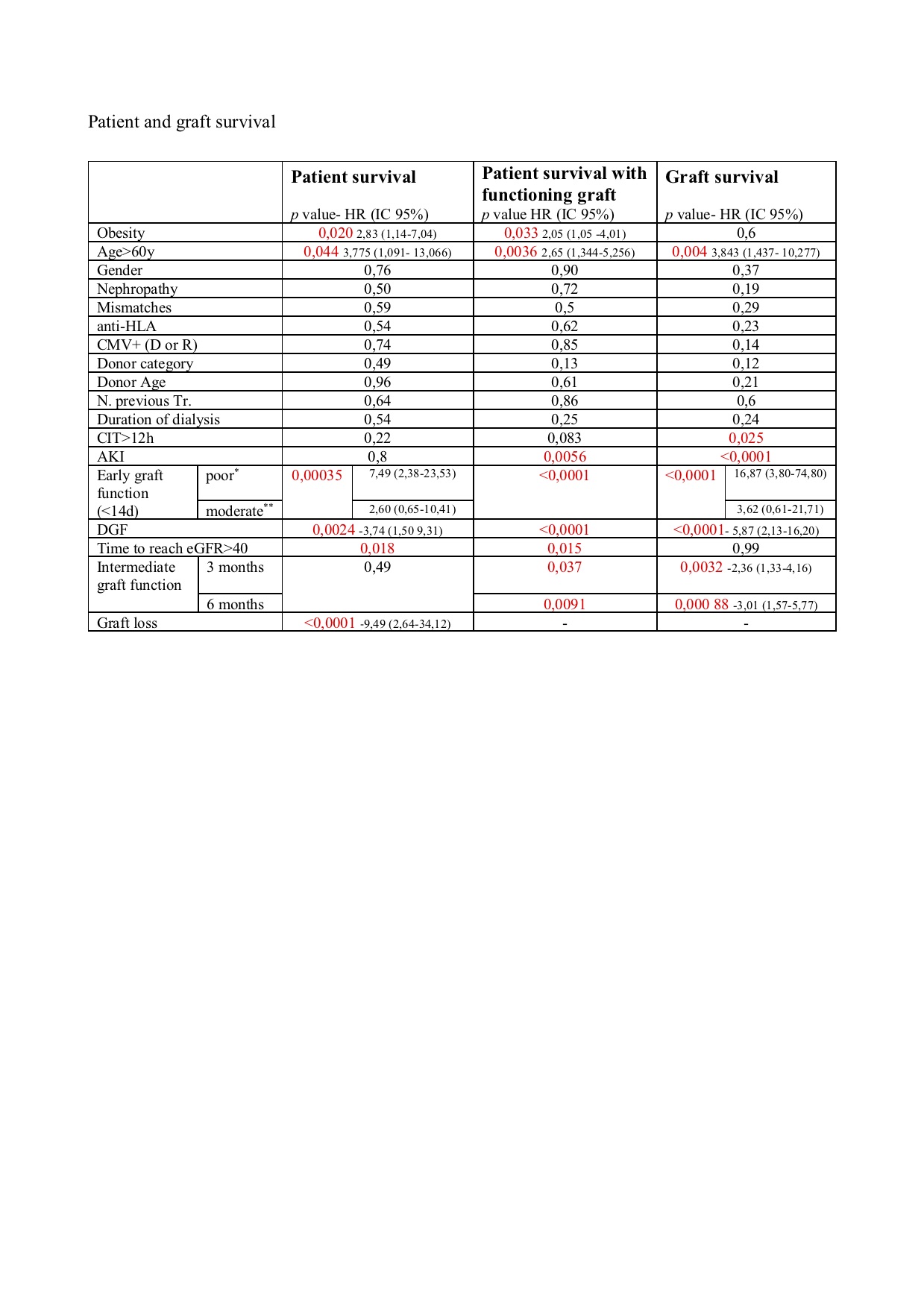Impact of Recipient Obesity on Kidney Transplantation Outcome: A Retrospective Cohort Study with a Matched Comparison
A. Buemi1, L. Romero1, F. Zech2, T. Darius1, M. De Meyer1, A. Devresse3, N. Kanaan3, E. Goffin3, M. Mourad1
1Surgery, Cliniques Universitaires Saint Luc, Bruxelles, Belgium, 2Internal Medicine, Cliniques Universitaires Saint Luc, Bruxelles, Belgium, 3Nephrology, Cliniques Universitaires Saint Luc, Bruxelles, Belgium
Meeting: 2020 American Transplant Congress
Abstract number: D-031
Keywords: Kidney transplantation, Obesity
Session Information
Session Name: Poster Session D: Kidney: Cardiovascular and Metabolic Complications
Session Type: Poster Session
Date: Saturday, May 30, 2020
Session Time: 3:15pm-4:00pm
 Presentation Time: 3:30pm-4:00pm
Presentation Time: 3:30pm-4:00pm
Location: Virtual
*Purpose: The benefit of renal transplantation in obese patients is changeling. This study was undertaken to determine the effect of recipient obesity on patient and graft survival and postoperative outcomes.
*Methods: A single-institution, retrospective study was performed on renal transplant obese recipients (BMI≥ 30 kg/m2) from January 2010 to December 2018 matched with non-obese recipients (BMI < 30 kg/m2). Every transplanted obese recipient was paired with 2 transplanted non obese recipient with a same age, sex and period of transplantation. The comparative analysis included patient and graft survival as primary outcome and medical and surgical complications, hospital stay, onset of delayed graft function (DGF), acute rejection episodes and early and intermediate (2 years) graft function as secondary outcome.
*Results: 102 obese patients were compared to 204 non-obese patients. Demographic data were comparable in both groups except for a highest rate of metabolic nephropathy in the obese population (, RR=1,883, 95% CI 1,331-2,539, p=0,00063).Obesity is strongly related to a worst patient survival (HR=2,83 95% CI 1,14-7,04, p=0.02) but there is no difference in graft survival compared to the non-obese population.Early graft function is poorer in the obese population (p<0,0001). During follow-up no statistically significant graft function differences are observed in both groups.Moreover, obese recipients had significantly an higher risk of DGF (HR=1,93 95% CI 1,19-3,1, p=0,0077), stroke (HR=7, 95% CI 1,68-29,26,p=0,0042), infections (HR=1,61, 95% CI 1,01-2,56 p=0,048) especially wound infection (HR=8 95% CI 1,96-32,87, p=0,0015), diabetes aggravation (HR=3,13 95% CI 1,29-7,6 p=0,011) and surgical revision (HR=8, 95% CI 1,22-52,82 p=0,026) when compared to non-obese recipients.
*Conclusions: Our study clearly demonstrates a negative impact of obesity on patient survival and post-operative course. Although the poor early renal function in obese patients, no difference is observed at long term. These considerations should be taken into account when the obese patient is considered for transplantation.
To cite this abstract in AMA style:
Buemi A, Romero L, Zech F, Darius T, Meyer MDe, Devresse A, Kanaan N, Goffin E, Mourad M. Impact of Recipient Obesity on Kidney Transplantation Outcome: A Retrospective Cohort Study with a Matched Comparison [abstract]. Am J Transplant. 2020; 20 (suppl 3). https://atcmeetingabstracts.com/abstract/impact-of-recipient-obesity-on-kidney-transplantation-outcome-a-retrospective-cohort-study-with-a-matched-comparison/. Accessed January 15, 2026.« Back to 2020 American Transplant Congress

